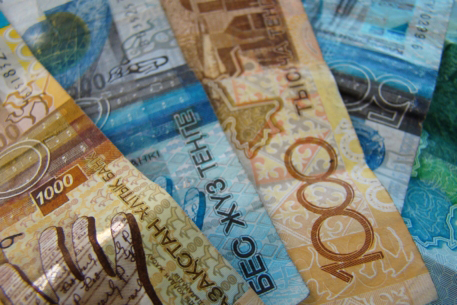Baku, Azerbaijan, Feb. 13
Trend:
The devaluation of Kazakhstan's national currency from 155 tenge to 185 tenge per dollar has become the main topic of discussion the country's society and media in last two days.
This event completely eclipsed all others, including the renaming of Kazakhstan proposed by President Nursultan Nazarbayev at the end of the last week.
Although there were rumors about the possibility of devaluation of tenge for a long time and they were intensified especially after the proposal to introduce a new 20,000 tenge bond, the refusal of the National Bank from further keeping the national currency at a stable level became a surprise for Kazakhs.
As a result, a number of exchange offices in the country were closed, while others took advantage of the panic among the population and began to change currency at an exorbitant rate, exceeding 200 tenge per dollar. A number of stores, primarily those selling equipment and other imported goods also suspended their operations.
However, all this is only a transient process, and the real changes it will bring to people and the economy as a whole will be visible only after its completion.
Kazakhstan already has experience of the devaluation of its currency. In February 2009, the National Bank of Kazakhstan weakened the tenge by 25 percent compared to dollar. The consequences of the current devaluation will be similar to the effects of cheapening the national currency in 2009. However, the government of Kazakhstan has the opportunity to consider and correct past mistakes.
In general, experts share the opinion that any devaluation will lead to higher prices. In Kazakhstan, it will primarily affect the prices of imported goods, which are highly visible in the country. A rise in prices on other goods and services should be expected, while the national airline of Kazakhstan Air Astana has already announced an increase in prices on international flights.
Several officials of the country have already called for taking measures to curb the rising of prices, and the Ministry of Finance said that inflation will remain within the forecasted volume of 8 to 10 percent. However, there are spheres in which prices are regulated by the market, and the change in tariffs for public services, oil products remains the prerogative of the state. And the state can keep their prices at the same level in the coming months.
Devaluation will also adversely affect individuals and companies paying interest on dollar loans, which are quite common in the country.
At the same time, the devaluation may give a certain impetus to the country's economic development.
In particular, the companies exporting products abroad will benefit from the decrease of the exchange rate of Kazakh currency.
"The devaluation of Kazakh currency will have positive impact on large national production companies the products of which are export oriented, such as Kazakhmys," a group engaged in production of copper and other metals told Interfax-Kazakhstan agency.
Additionally, as a result of increase of price difference between Kazakh and imported goods, the domestic producers will be more competitive.
Currently, there is concern in Kazakh society that may be the devaluation that occurred on February 11 is not the last one and another downfall of the national currency is not far off. Similar sentiments were also observed in 2009. During that time the concerns about the national currency of Kazakhstan were more justified, as the prices for oil which is the country's main income source, were dropping. But even then, the negative predictions didn't come true and tenge remained relatively stable over the five years. Currently, oil prices are relatively stable, and accordingly, the reasons for the recurrent fall of the exchange rate are less. But given the fact that tenge remains the currency heavily controlled by the state, it is difficult to make predictions about its future stability. In general, as Deputy Prime Minister - Kazakh Minister of Finance Bakhyt Sultanov said yesterday, one should always be ready for devaluation and keep their savings in different currencies.
Elena Kosolapova Trend commentator
Translated by L.Z.
Edited by C.N.






